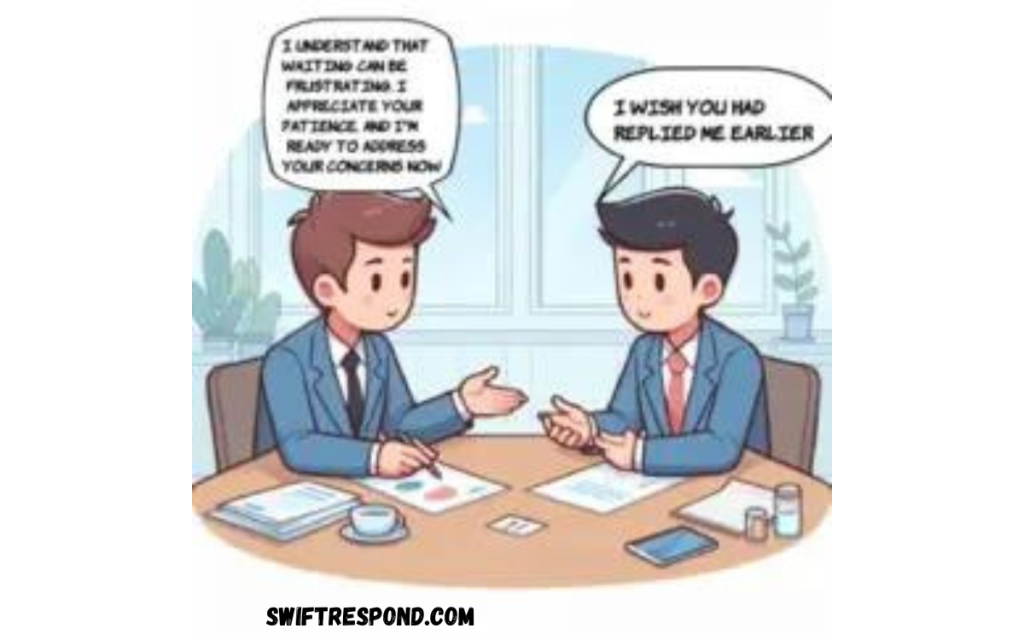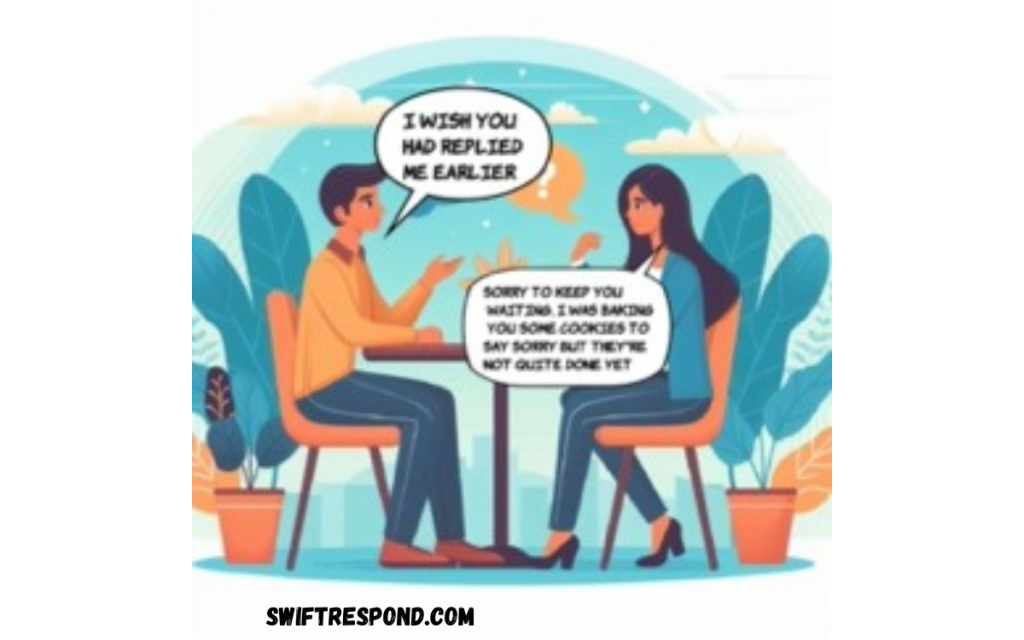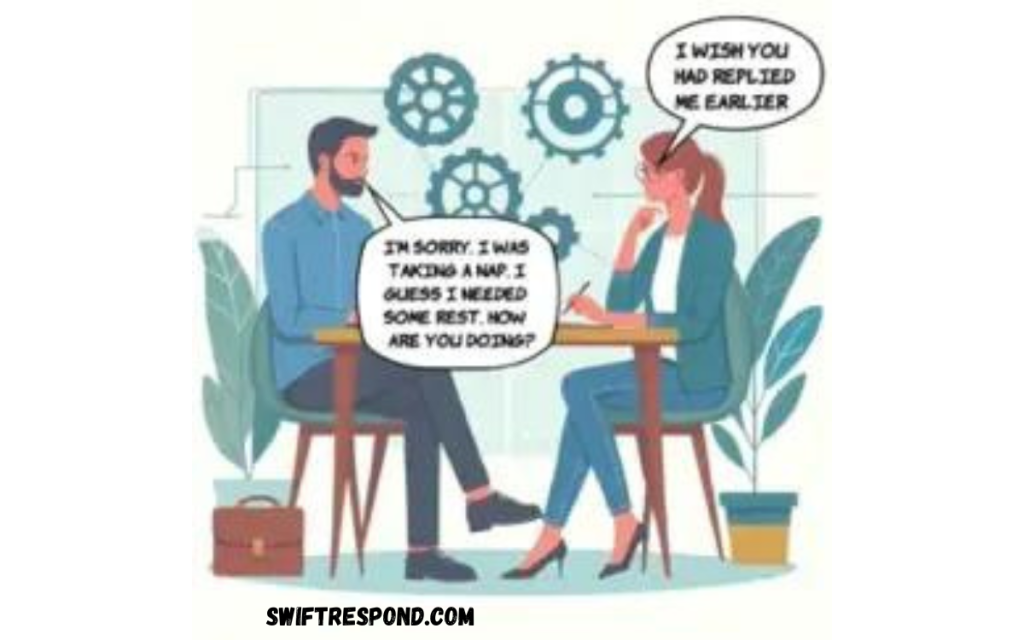Table of Contents
In the realm of interpersonal communication, timing often plays a pivotal role, dictating the flow and depth of relationships. “I wish you had replied earlier” encapsulates a sentiment that resonates with many, echoing the frustration and longing that accompany delayed responses. Whether in the context of friendships, romantic entanglements, or professional endeavors, the repercussions of untimely communication reverberate far beyond the initial exchange.
At its core, the phrase embodies a sense of yearning for connection and validation. When met with silence or delayed replies, individuals are left grappling with uncertainty, questioning their worth and significance in the eyes of the recipient. The passage of time only serves to exacerbate these feelings, intensifying the sting of perceived neglect or indifference. In essence, “I wish you had replied earlier” encapsulates not only a desire for timely acknowledgment but also a longing for reassurance and affirmation of one’s importance.
Beyond the emotional implications, delayed responses can also have practical consequences, impacting decision-making processes and the progression of interactions. In professional settings, for instance, a delayed response to an urgent query can impede workflow, leading to missed opportunities or compromised outcomes. Similarly, in personal relationships, prolonged silence can sow seeds of doubt and discord, fostering misunderstandings and eroding trust.
Moreover, the advent of digital communication has introduced new complexities to the dynamics of response times. While instantaneous messaging platforms offer unprecedented convenience, they also foster a culture of immediacy, where delayed responses are often perceived as a deliberate snub rather than a product of circumstance. The pressure to maintain constant availability further amplifies this perception, leaving individuals feeling neglected or overlooked when their messages go unanswered.
Yet, amidst the frustration and disappointment, “I wish you had replied earlier” also serves as a poignant reminder of the importance of empathy and understanding in our interactions. Behind every delayed response lies a myriad of possible explanations – from overwhelming workloads to unforeseen emergencies. By extending grace and recognizing the complexities of human experience, we can cultivate a culture of compassion and patience, fostering deeper connections and stronger bonds.
“I wish you had replied earlier” encapsulates a universal longing for connection and validation, echoing the complexities of human communication in an increasingly fast-paced world. By acknowledging the impact of untimely responses and cultivating empathy in our interactions, we can strive towards more meaningful connections, bridging the gaps created by silence and fostering understanding in the spaces between words.
My apologies for the delayed response, Time got away from me, but I’m here now, How can I assist you?
No need to apologize; I completely understand how time can slip away from us. I appreciate your response nonetheless. Now that you’re here, I’d like to take this opportunity to discuss [insert topic of discussion]. Whether it’s resolving an issue, brainstorming ideas, or simply seeking advice, your input is valuable to me. So, let’s dive in and make the most of our conversation.
I understand that waiting can be frustrating, I appreciate your patience, and I’m ready to address your concerns now

I understand that waiting can be frustrating, and I appreciate your patience during this time. Your willingness to wait demonstrates your commitment and understanding, for which I am truly grateful. Please know that your concerns are important to me, and I am fully prepared to address them now. Whether it’s clarifying misunderstandings, resolving issues, or providing the information you seek, I am here to offer my full attention and assistance.
Your satisfaction and peace of mind are my top priorities, and I am committed to ensuring that we navigate through any challenges together. Thank you once again for your patience and understanding. Let’s now focus on addressing your concerns and moving forward positively.
Better late than never, right? How can I make it up to you?
“Better late than never, right?” This timeless adage encapsulates a sentiment of redemption and forgiveness, acknowledging that while delayed actions may fall short of expectations, they still hold the potential to mend and reconcile. When confronted with the repercussions of tardiness, whether in communication or action, expressing a sincere desire to make amends is paramount.
By acknowledging the delay and taking responsibility for the oversight, one demonstrates humility and a willingness to rectify the situation. However, mere words may not suffice to bridge the gap created by the delay. Actions speak volumes in demonstrating genuine remorse and commitment to rebuilding trust.
I apologize for the delay, Let’s put that behind us and focus on moving forward, How can I help you today?
I apologize for the delay in responding to your message. Let’s put that behind us and focus on moving forward. Your time and concerns are important to me, and I appreciate your patience. How can I assist you today?
It’s essential to acknowledge any lapses in communication and take responsibility for them. While delays may sometimes be unavoidable due to various circumstances, they should not hinder our ability to address your needs promptly. Your satisfaction and comfort in our interactions are paramount, and I’m committed to ensuring that moving forward, you receive the assistance and attention you deserve.
I’m sorry for the late reply. Life has a way of keeping us busy, What can I do for you now?
I apologize for the delayed response. Life’s demands often have a way of monopolizing our time and attention, leaving little room for timely communication. Nevertheless, I’m here now and ready to address any needs or concerns you may have. Despite the delay, please know that your message hasn’t gone unnoticed or unappreciated.
Moving forward, how can I assist you? Whether it’s resolving an issue, providing information, or simply lending an ear, I’m committed to ensuring that your needs are met to the best of my abilities. Despite the passage of time, my dedication to serving you remains unwavering.
I appreciate your understanding, Sometimes, things slip through the cracks, Is there something specific you need assistance with?
I appreciate your understanding. Sometimes, despite our best efforts, things slip through the cracks. Whether it’s a missed deadline, a delayed response, or an oversight in communication, we all encounter moments where our intentions falter amidst the chaos of everyday life. Your understanding in such instances is truly invaluable, serving as a beacon of support amidst the challenges we face. It reminds us that perfection is an unattainable standard and that genuine connections are forged through empathy and understanding.
Whoops, got caught up in other things. But I’m all yours now – what’s on your mind?
“Whoops, got caught up in other things.” It’s a phrase many of us have uttered at some point, acknowledging that life’s demands can sometimes pull us away from our intended focus. Whether it’s a sudden work assignment, a family emergency, or simply the whirlwind of daily responsibilities, distractions abound, often derailing our best-laid plans. In those moments, communication can falter, leaving messages unanswered and connections temporarily severed.
Yet, there’s a sense of accountability and openness inherent in admitting to being sidetracked. It’s an acknowledgment of fallibility, a recognition that we’re not always able to prioritize every aspect of our lives simultaneously. By owning up to our distractions, we invite understanding and empathy from those we may have momentarily left waiting.
Sorry to keep you waiting, I was baking you some cookies to say sorry but they’re not quite done yet

I apologize for the delay; I truly didn’t intend to keep you waiting. I was caught up in an attempt to make things right, albeit in a slightly unconventional manner. You see, I embarked on a mission to bake you some cookies as a token of apology. However, in my eagerness to remedy the situation, I may have underestimated the time required for them to reach perfection. As I stand here, I can assure you that the aroma wafting from the oven promises a delightful treat in the making, but alas, they’re not quite done yet.
Sorry for the delay in getting back to you, You know what they say, ‘Good things come to those who wait.’ How can I assist you today?
Apologies for the delay in getting back to you. As the saying goes, ‘good things come to those who wait,’ and I appreciate your patience. Now that we’re connected, I’m here to assist you in any way I can. Whether you have questions, need assistance with a problem, or are seeking information, I’m ready to lend a hand. Your time is valuable, and I’m committed to ensuring that we make the most of it. So please, feel free to let me know how I can be of service to you today. Whether it’s addressing concerns, providing guidance, or offering solutions, I’m here to help.
I apologize for the delay, I didn’t mean to keep you waiting. Is everything okay?
I sincerely apologize for the delay in my response; it was never my intention to keep you waiting. I understand that timely communication is essential, and I regret any inconvenience or concern my delayed reply may have caused. Your time and attention are valuable to me, and I want to assure you that I take our interaction seriously.
I hope everything is alright on your end despite the delay. If there were any pressing matters or concerns you wished to address, please feel free to share them with me. I value open communication and want to ensure that you feel heard and supported in our interactions.
I apologize for the delayed response, Let’s make the most of our time now, How can I help you?
Moving forward, how can I assist you? Whether you’re seeking information, guidance, or support, I’m here to lend a helping hand. Your satisfaction and success are paramount, and I’m eager to contribute in any way I can. Feel free to share your thoughts, and together, we can navigate through any challenges or obstacles you may be facing.
Rest assured that despite the delay, my dedication to providing timely and valuable assistance remains unwavering. Your trust and confidence in my ability to serve you are deeply appreciated, and I’m determined to exceed your expectations. Let’s embark on this journey together, with open communication and mutual respect guiding our interactions. Thank you for your understanding, and let’s make this moment count.
I’m sorry for the wait, Your message is important to me, and I’m here to give it the attention it deserves
I apologize for the delay in responding. Your message holds significance to me, and I understand the importance of timely communication. Sometimes, unforeseen circumstances arise, causing unavoidable delays. However, please know that your patience is deeply appreciated, and I am committed to giving your message the attention and consideration it deserves.
Apologies for the delay, It’s been a busy day, but I assure you, I’m here now and ready to assist you
I sincerely apologize for the delay in getting back to you. It’s been an incredibly busy day filled with unexpected tasks and urgent priorities that demanded my immediate attention. Please know that your inquiry was not overlooked or disregarded; rather, it was simply a matter of navigating through a particularly hectic schedule. However, I want to assure you that I am fully committed to addressing your needs and providing you with the assistance you require. Despite the challenges of the day, I am now here and completely focused on supporting you in any way I can. Your satisfaction and peace of mind are paramount to me, and I am ready to dedicate my undivided attention to ensuring that your concerns are promptly addressed.
Once again, I apologize for any inconvenience caused by the delay, and I appreciate your patience and understanding. Please feel free to share your questions or concerns, and I will do my utmost to assist you to the best of my abilities.
I’m sorry, I was taking a nap, I guess I needed some rest, How are you doing?

“I’m sorry, I was taking a nap,” conveys a genuine apology wrapped in a touch of vulnerability. In our fast-paced lives, moments of respite are often overlooked, and admitting to the need for rest takes courage. The acknowledgment of a nap implies not negligence but rather a necessary pause to recharge, highlighting the importance of self-care in maintaining balance amidst life’s demands. By extending this explanation, it offers a glimpse into the human aspect of the interaction, fostering understanding and empathy in the exchange.
I apologize for the late response, I was out with some friends and I didn’t hear my phone, What’s up?
I sincerely apologize for the delayed response; it wasn’t intentional. I found myself caught up in an unexpected moment of camaraderie with friends, and amidst the laughter and conversation, I failed to hear the notifications on my phone. It’s a testament to the joy of unplanned encounters and the richness of human connection, albeit at the expense of timely communication. However, now that I’m back and fully attentive, I’m eager to catch up and hear what’s been on your mind. So, what’s up? Please feel free to share anything you’d like to discuss; I’m here and ready to engage in conversation. Let’s bridge the gap created by the delay and pick up right where we left off. Your understanding and patience are greatly appreciated, and I’m committed to ensuring that our dialogue continues smoothly from this point forward.
Why do people say “I wish you had replied earlier”?
This phrase is often uttered out of frustration or disappointment when someone receives a delayed response to a message. It expresses a desire for timely communication and acknowledgment, highlighting the importance of prompt responses in maintaining effective and respectful interactions.
What are the potential reasons for delayed responses?
There can be various reasons for delayed responses, ranging from busy schedules and distractions to technical issues or simply forgetting to check messages. Sometimes, individuals might prioritize other tasks or commitments over responding to messages immediately, leading to delays that may inadvertently cause frustration or misunderstanding.
How can delayed responses affect relationships?
Delayed responses can have both emotional and practical implications on relationships. Emotionally, they may lead to feelings of neglect, insecurity, or frustration, especially if the delayed message was perceived as important or urgent. Practically, delays can hinder effective communication, leading to misunderstandings, missed opportunities, or even strain on the relationship if not addressed promptly.
What can be done to mitigate the impact of delayed responses?
To mitigate the impact of delayed responses, it’s essential to communicate openly about expectations regarding response times and to prioritize active listening and timely acknowledgment of messages. Setting clear boundaries, establishing communication norms, and being transparent about availability can also help manage expectations and reduce frustration when delays occur.
How can individuals navigate the aftermath of delayed responses?
Navigating the aftermath of delayed responses requires empathy, understanding, and effective communication. Acknowledging the delay, offering a sincere apology if necessary, and actively engaging in the conversation can help rebuild trust and mitigate any negative effects on the relationship. Additionally, being proactive in addressing any concerns or issues that may have arisen due to the delay can help prevent similar situations in the future.
Conclusion
The sentiment of “I wish you had replied earlier” underscores the nuanced dynamics of communication in our interpersonal interactions. It encapsulates the longing for timely acknowledgment, the frustration of delayed responses, and the impact such delays can have on relationships, both emotionally and practically.
Navigating the aftermath of delayed responses requires empathy, understanding, and effective communication. It’s essential to recognize the potential reasons for delays, whether they stem from busy schedules, technical issues, or simply oversight, and to address them with openness and transparency.
